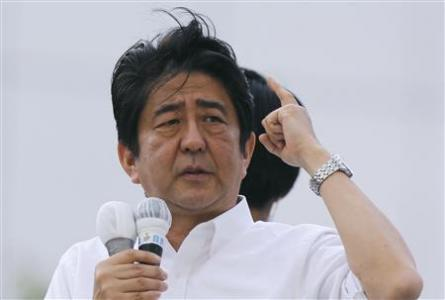Big Choices Face Japan’s Prime Minister
Opinion

WASHINGTON -- With his newly won parliamentary majority in both houses of the Diet, Japanese Prime Minister Shinzo Abe faces an important choice. Will he govern as a pragmatist working to improve Japan’s economy? Or will he govern as a nationalist who engages in territorial disputes with neighbors and tries to amend Japan’s constitution to create a bigger, stronger and less-restricted military?
The choice Abe makes will have profound implications not just for Japan but for the U.S., all of Asia and much of the world.
Early indications are that Abe intends to be a pragmatist. In his first news conference after the July 21 parliamentary election, he pledged to focus the upcoming parliamentary session on implementing economic growth. This is certainly what Japanese voters want. Media exit polls show that 70 percent of voters approve of Abe’s economic policies, while voters are sharply divided on his national security policy agenda.
The test for Abe’s pragmatism begins with whether he can use his political leverage to address the key issues facing Japan’s economy. If he can win Diet approval of Japan’s participation in the Trans-Pacific Partnership free trade agreement, full implementation of “Abenomics” (his three-part economic growth strategy), pension reform and an increased consumption tax, he stands a good chance of sparking the biggest Japanese economic recovery in two decades.
On the other hand, Abe may choose to use his new popularity to push forward his assertive security policy agenda. He has already indicated that he'd be interested in seeking a bigger defense budget and in revising Japan’s postwar constitution to no longer limit the Japanese Self-Defense Force to a highly restricted defensive role under the post-World War II constitution.
Changing Japan’s constitution to expand the role of the Self-Defense Force is a deeply divisive issue in Japan, and one that upsets neighbors who were the victims of Japanese aggression in World War II. Komeito, the small political party that is LDP’s coalition partner in the Diet, has expressed strong opposition to a constitutional revision. If Abe tries to strengthen Japan’s military in this way, the parliamentary fight the move would kick off would erode his political support and make it hard for him win Diet approval for his economic agenda and other measures.
Abe and his Liberal Democratic Party, or LDP, scored a big election victory July 21, winning 65 out of 121 seats that were up for re-election in the upper house of the Diet. With coalition partner Komeito, which won 11 seats, LDP now enjoys a majority of 135 seats in the 242-seat upper house.
The victory brings Abe and his government much-needed political stability, ending the split control of Japan’s two houses of parliament -- a situation known as the “twisted Diet” -- that has prevailed since 2006. As in the U.S. Republican-controlled House of Representatives and the Democratic-controlled Senate, the control by different parties in the two- house Japanese Diet led to gridlock that prevented legislative action on key issues facing the nation.
With no parliamentary election expected until 2016, the July 21 election has given Abe and his government a period of political stability that Japan has desperately sought for the past seven years.
The LDP coalition victory also accelerated the decline of the Democratic Party of Japan (DPJ), which governed the country between 2009 and 2012. DPJ only won 17 seats in the July 21 election, suffering the worst defeat since it was created in 1998. If the DPJ can't revive itself as a viable opposition force, the LDP-Komeito rule of Japan could last long beyond Abe.
How Abe will use his enhanced political standing at home in stabilizing Japan’s relations with South Korea and China can be an important indicator of his ability to operate pragmatically. Japan’s relations with the two nations have been strained since this spring. But before the recent parliamentary election, Abe’s government behaved as if it had given up on improving relations with Beijing and Seoul.
Making overtures now toward South Korea and China won't be easy. As Japan’s relations with the two nations have worsened over territorial disputes involving the control of islands and other issues, so have attitudes of the Japanese public. But Abe realizes that while there are areas of deep disagreement between Japan, South Korea and China, Japan needs good relations with its militarily and economically powerful neighbors. With reinforced political standing at home, Abe should find himself in a better position to reach out to Beijing and Seoul.
Washington seems to be cautiously optimistic about the postelection Abe government. There are some U.S. concerns about how Abe capitalizes on his strengthened position after spending his first six months in office with a twisted Diet. But political stability in Tokyo should serve as a solid foundation on which Prime Minister Abe and President Obama can actively engage and work together to further improve already good bilateral relations and tackle a wide range of policy issues
Yuki Tatsumi is senior associate of the East Asia Program at the Stimson Center, a nonprofit and nonpartisan think tank that studies peace and security challenges around the world.
© Copyright IBTimes 2024. All rights reserved.





















